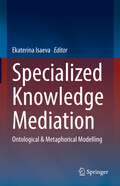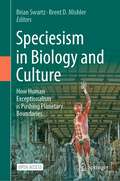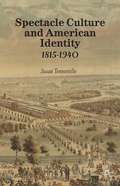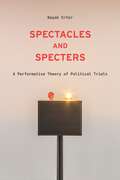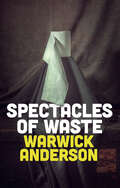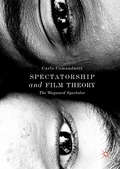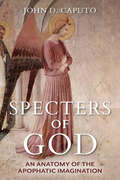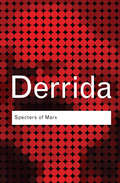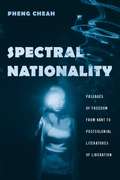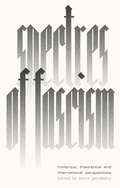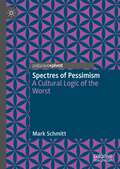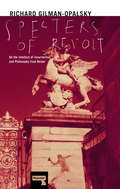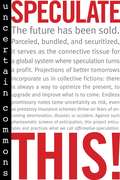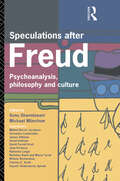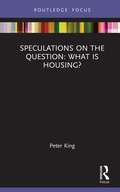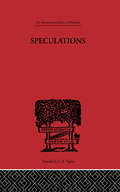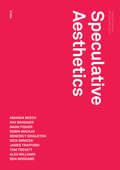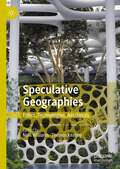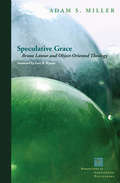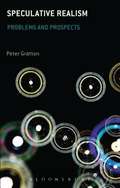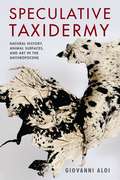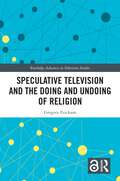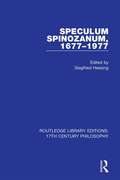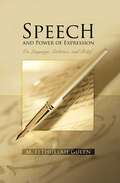- Table View
- List View
Specialized Knowledge Mediation: Ontological & Metaphorical Modelling
by Ekaterina IsaevaThis book provides an integrated approach to cognitive-linguistic mediation, with aims toward the efficiency of knowledge transfer and acquisition. Problems are approached through the prism of cognitive modelling, and mapped to such fields as intercultural and interdisciplinary communication, and second language teaching. The novelty lies in the synergies between linguistics, cognitive science, artificial intelligence, culture, and industry. These fields come together through ontological and metaphorical modelling and the attempts to automate such. This text provides a theoretical background for research on mediation, covering cognitive and communicative perspectives, metaphoricity of terms, and the ontologization of human knowledge. It includes detailed descriptions of methods for different types of cognitive modelling and is intended for students and researchers concerned with terminology, cognitive linguistics, applied linguistics, pragmatics, computational linguistics, literature studies, morphology, syntaxis, and semantics.
Speciesism in Biology and Culture: How Human Exceptionalism is Pushing Planetary Boundaries
by Brent D. Mishler Brian SwartzThis open access book explores a wide-ranging discussion about the sociopolitical, cultural, and scientific ramifications of speciesism and world views that derive from it. In this light, it integrates subjects across the natural sciences, social sciences, and humanities. The 21st-century western world is anthropocentric to an extreme; we adopt unreasonably self-centered and self-serving ideas and lifestyles. Americans consume more energy resources per person than most other nations on Earth and have little concept of how human ecology and population biology interface with global sustainability. We draw upon religion, popular culture, politics, and technology to justify our views and actions, yet remain self-centered because our considerations rarely extend beyond our immediate interests. Stepping upward on the hierarchy from “racism,” “speciesism” likewise refers to the view that unique natural kinds (species) exist and are an important structural element of biodiversity. This ideology manifests in the cultural idea that humans are distinct from and intrinsically superior to other forms of life. It further carries a plurality of implications for how we perceive ourselves in relation to nature, how we view Judeo-Christian religions and their tenets, how we respond to scientific data about social problems such as climate change, and how willing we are to change our actions in the face of evidence.
Spectacle Culture And American Identity
by Susan TennerielloScenic spectacles collapse the borders of graphic and visual arts, multimedia technology, spectatorship and architecture. Drawing upon various systems of commercial, institutional and public spectacle that intersect with scenic stages of the national landscape, Tenneriello examines how spectacle is entrenched in the formation of national identity.
Spectacles and Specters: A Performative Theory of Political Trials
by Başak ErtürWINNER, SLSA SOCIO-LEGAL THEORY AND HISTORY PRIZESHORTLISTED, THE HART-SLSA BOOK PRIZESpectacles and Specters draws on theories of performativity to conceptualize the entanglements of law and political violence, offering a radical departure from accounts that consider political trials as instrumental in exercising or containing political violence. Legal scholar Başak Ertür argues instead that making sense of the often incalculable interpenetrations of law, politics, and violence in trials requires shifting the focus away from law’s instrumentality to its performativity.Ertür develops a theory of political trials by reconstructing and building on a legacy of critical thought on Nuremberg in close engagement with theories of performativity. She then offers original case studies that introduce a new perspective by looking beyond the Holocaust trials, to the Armenian genocide and its fragmentary legal aftermaths. These cases include the 1921 trial of Soghomon Tehlirian, the 2007-21 Hrant Dink Murder Trial, and the 2015 case before the European Court of Human Rights concerning the denial of the Armenian genocide. Enabling us to capture the various modalities in which the political emerges in, through and in relation to legal forms on the stage of the trial, this focus on law’s performativity also allows us to account for how sovereign schemes can misfire and how trials can come to have unintended political lives and afterlives. Further, it reveals how law is entangled with and perpetuates certain histories of violence, rather than simply ever mastering these histories or providing closure.
Spectacles of Waste
by Warwick AndersonThe modern bathroom is an ingenious compilation of locked doors, smooth porcelain, 4-ply tissue and antibacterial hand soap, but despite this miracle of indoor plumbing, we still can’t bear the thought that anyone else should know that our bodies produce waste. Why must we live by the rules of this intense scatological embarrassment? In Spectacles of Waste, leading historian of medicine Warwick Anderson reveals how human excrement has always complicated humanity’s attempts to become modern. From wastewater epidemiology and sewage snooping to fecal transplants and excremental art, he argues that our insistence on separating ourselves from our bodily waste has fundamentally shaped our philosophies, social theories, literature and art—even the emergence of high-tech science as we understand it today. Written with verve and aplomb, Anderson’s expert analysis reveals how in recent years, humanity has doubled down on abstracting and datafying our most abject waste, and unconsciously underlined its biopolitical signature across our lives.
Spectatorship and Film Theory: The Wayward Spectator
by Carlo ComanducciThis book interrogates the relation between film spectatorship and film theory in order to criticise some of the disciplinary and authoritarian assumptions of 1970s apparatus theory, without dismissing its core political concerns. Theory, in this perspective, should not be seen as a practice distinct from spectatorship but rather as an integral aspect of the spectator’s gaze. Combining Jacques Rancière’s emancipated spectator with Judith Butler’s queer theory of subjectivity, Spectatorship and Film Theory foregrounds the contingent, embodied and dialogic aspects of our experience of film. Erratic and always a step beyond the grasp of disciplinary discourse, this singular work rejects the notion of the spectator as a fixed position, and instead presents it as a field of tensions—a “wayward” history of encounters.
Specters of God: An Anatomy of the Apophatic Imagination
by John D. CaputoIn Specters of God, John D. Caputo returns to the original impulse of his work, the "mystical element" in things, here under the name of an "anxious apophatics," as distinct from an "edifying apophatics" anchored in unity with God. In dialogue with Schelling, a new turn for him and the lynchpin of this argument, Caputo addresses the nocturnal powers in being, the specters that haunt our being and bring us up short. The result is an erudite and insightful analysis—in his usual lively and masterful style—of several key "spectral" figures from medieval angelology and Eckhart's Gottheit, through Luther's deus absconditus and Schelling's "Satanology," to the spectralization and virtualization of the world in the "posthuman" age. Arguing that the name of God is not the master name of a super-being who is going to save us but a placeholder for sources deep in our apophatic imaginary, he asks, Has "God" become a (holy) ghost of the past? A passing spectral effect of the ancient harmonies of the spheres? Does radical thinking culminate in a cosmopoetics beyond theism and its theology, in a doxology to the transient glory of the world, whatever it was in the beginning, however eerie its end, world without why?
Specters of Marx: The State of the Debt, the Work of Mourning and the New International
by Jacques DerridaProdigiously influential, Jacques Derrida gave rise to a comprehensive rethinking of the basic concepts and categories of Western philosophy in the latter part of the twentieth century, with writings central to our understanding of language, meaning, identity, ethics and values. In 1993, a conference was organized around the question, 'Whither Marxism?’, and Derrida was invited to open the proceedings. His plenary address, 'Specters of Marx', delivered in two parts, forms the basis of this book. Hotly debated when it was first published, a rapidly changing world and world politics have scarcely dented the relevance of this book.
Spectral Nationality: Passages of Freedom from Kant to Postcolonial Literatures of Liberation
by Pheng CheahThis far-ranging and ambitious attempt to rethink postcolonial theory's discussion of the nation and nationalism brings the problems of the postcolonial condition to bear on the philosophy of freedom. Closely identified with totalitarianism and fundamentalism, the nation-state has a tainted history of coercion, ethnic violence, and even, as in ultranationalist Nazi Germany, genocide. Most contemporary theorists are therefore skeptical, if not altogether dismissive, of the idea of the nation and the related metaphor of the political body as an organism. Going against orthodoxy, Pheng Cheah retraces the universal-rationalist foundations and progressive origins of political organicism in the work of Kant and its development in philosophers in the German tradition such as Fichte, Hegel, and Marx. Cheah argues that the widespread association of freedom with the self-generating dynamism of life and culture's power of transcendence is the most important legacy of this tradition. Addressing this legacy's manifestations in Fanon and Cabral's theories of anticolonial struggle and contemporary anticolonial literature, including the Buru Quartet by Indonesian writer Pramoedya Ananta Toer, and the Kenyan writer Ngugi Wa Thiong'o's nationalist novels, Cheah suggests that the profound difficulties of achieving freedom in the postcolonial world indicate the need to reconceptualize freedom in terms of the figure of the specter rather than the living organism.
Spectres of Fascism: Historical, Theoretical, and International Perspectives
by Samir GandeshaConcerns over the rise of fascism have been preoccupied with the Trump presidency and the Brexit vote in the UK, yet, globally, we are witnessing a turn towards anti-democratic and illiberal forces. From the tragic denouement of the Egyptian Revolution to the consolidation of the so-called Gujarat Model in India under the leadership of Prime Minister Narendra Modi and the consolidation of the power of Turkish President Recep Tayyip Erdogan, to the recent election of Jair Bolsonaro in Brazil, fascist ideology, aesthetics, and personalities appear across the globe. Spectres of Fascism makes a significant contribution to the unfolding discussion on whether what we are witnessing today is best understood as a return to classic twentieth-century fascism or some species of what has been called “post-fascism.” Applying a uniquely global perspective, it combines analyses of historical contexts, theoretical approaches, and contemporary geopolitics.
Spectres of Pessimism: A Cultural Logic of the Worst
by Mark SchmittThis book argues that philosophical pessimism can offer vital impulses for contemporary cultural studies. Pessimist thought offers ways to interrogate notions of temporality, progress and futurity. When the horizon of future expectation is increasingly shaped by the prospect of apocalypse and extinction, an exploration of pessimist thought can help to make sense of an increasingly complex and uncertain world by affirming rather than suppressing the worst. This book argues that a cultural logic of the worst is at work in a substantial section of contemporary philosophical thought and cultural representations.Spectres of pessimism can be found in contemporary ecocritical thought, antinatalist philosophies, political thought, and cultural theory, as well as in literature, film, and popular music. In its unsettling of temporality, this new pessimism shares sensibilities with the field of hauntology. Both deconstruct linear narratives of time that adhere to a stable sequence of past, present and future. Mark Schmitt therefore couples pessimism and hauntology to explore the spectres of pessimism in a range of theories and narratives—from ecocriticism, antinatalism and queer theory to utopianism, from afropessimism to the fiction of Hari Kunzru and Thomas Ligotti to the films of Camille Griffin, Gaspar Noé, Denis Villeneuve and Lars von Trier.
Spectres of Revolt
by Richard Gilman-OpalskyIn 1848, Karl Marx declared that a communist specter was haunting Europe. In 1994, Jacques Derrida considered how the spectre of Marx would haunt the post-Cold War world. In Specters of Revolt, Gilman-Opalsky argues that the world is haunted by revolt, by the possibility of events that interrupt and disrupt the world, that throw its reality and justice into question. But recent revolt is neither decisively communist nor decisively Marxist. Gilman-Opalsky develops a theory of revolt that accounts for its diverse critical content about autonomy, everyday life, anxiety, experience, knowledge, and possibility. The 1994 uprising of the Mexican Zapatistas set the stage for new forms of revolt against a newly expanded power of capital. In the 20 years since, including the recent phase of global uprisings that began in 2008 with the Greek revolts, insurrection has spoken in the "Arab Spring" in Spain, Turkey, Brazil, and in the U.S. in Occupy Wall Street, Ferguson, and Baltimore, among other places. In light of recent global uprisings, Gilman-Opalsky aims to move beyond the critical theory of revolt to an understanding of revolt as theory itself. Making use of diverse sources from Raoul Vaneigem and Félix Guattari to Julia Kristeva and Raya Dunayevskaya, Spectres of Revolt explores upheaval as thinking, the intellect of insurrection, and philosophy from below.From the Trade Paperback edition.
Speculate This!
by Uncertain CommonsA short, timely manifesto critiquing predatory modes of financial speculation that seek to minimize uncertainty and risk, while advocating speculative practices that embrace uncertainty, spur radical change, and enable alternative futures.
Speculations After Freud: Psychoanalysis, Philosophy and Culture
by Sonu Shamdasani Michael MünchowPsychoanalysis has transformed our culture. We constantly use and refer to ideas from psychoanalysis, often unconsciously. Psychology, philosophy, politics, sociology, women's studies, anthropology, literary studies, cultural studies, and other disciplines have been permeated by the competing schools of psychoanalysis. But what of psychoanalysis itself? Where is it going one hundred years after Freud's own speculations took shape? Does it still have a role to play in cultural debate, or should it perhaps be abandoned? Speculations After Freud confronts the dilemmas of contemporary psychoanalysis by bringing together some of the most influential and best known writers on psychoanalysis, philosophy and culture. The advocates and critics of psychoanalysis, both institutional and theoretical, critically appraise the powerful role psychoanalytic speculation plays in all areas of culture.
Speculations on the Question: What Is Housing? (Routledge Focus on Housing and Philosophy)
by Peter KingThis book consists of a single essay that speculates on the question what is housing?, and its opposite question, what is not housing? The essay is organised around two distinct discourses around which housing can be framed. The first, which is the dominant discourse, is what I term policy thinking. This is where housing is seen solely in terms of policy formulation and action. The second discourse is private dwelling, which describes housing in terms of a private space used by households. Private dwelling might be seen as a product of policy, but, in actuality, it precedes policy thinking in being the very purpose of policy. Having made this distinction between policy thinking and private dwelling, and so stated in principle what housing is, the subsequent sections of the essay explore the nature of private dwelling in more detail and so substantiate the distinction between the two forms of discourse.
Speculations: Essays on Humanism and the Philosophy of Art (International Library of Philosophy)
by Herbert Read T E Hulme Jacob EpsteinFirst published in 2000. Routledge is an imprint of Taylor & Francis, an informa company.
Speculative Aesthetics (Urbanomic / Redactions #4)
by Robin MackayAn examination of the new technological mediations between the human sensorium and the planetary media network and of the aesthetic as an enabler of new modes of knowledge.This series of interventions on the ramifications of Speculative Realism for aesthetics ranges from contemporary art's relation to the aesthetic, to accelerationism and abstraction, logic and design.From varied perspectives of philosophy, art, and design, participants examine the new technological mediations between the human sensorium and the massive planetary media network within which it now exists and consider how the aesthetic enables new modes of knowledge by processing sensory data through symbolic formalisms and technological devices.Speculative Aesthetics anticipates the possibility of a theory and practice no longer invested in the otherworldly promise of the aesthetic, but acknowledging the real force and traction of images in the world today, experimentally employing techniques of modelling, formalisation, and presentation so as to simultaneously engineer new domains of experience and map them through a reconfigured aesthetics that is inseparable from its sociotechnical conditions.
Speculative Geographies: Ethics, Technologies, Aesthetics
by Thomas Keating Nina WilliamsThis book explores how speculative thinking is shaping how we relate to our entangled social, mental, and environmental ecologies. It examines how speculative philosophies and concepts are changing geographical research methods and techniques, whilst also developing how speculative thinking transforms the way human, non-human, and more-than-human things are conceptualised in research practices across the social sciences, arts, and humanities. Offering the first dedicated compendium of geographical engagements with speculation and speculative thinking, the chapters in this edited collection advance debates about how affective, imperceptible, and infra-sensible qualities of environments might be written about through alternative registers and ontologies of experience. Organised around the themes of Ethics, Technologies, and Aesthetics, the book will appeal to those engaging with architecture, Black political theory, fiction, cinema, children’s geographies, biotechnologies, philosophy, rural studies, arts practice, and nuclear waste studies as speculative research practices appropriate for addressing contemporary ecological problems.Chapters 1, 3 and 4 are available open access under a Creative Commons Attribution 4.0 International License via link.springer.com.
Speculative Grace: Bruno Latour and Object-Oriented Theology (Perspectives in Continental Philosophy)
by Adam S. MillerThis book offers a novel account of grace framed in terms of Bruno Latour’s “principle of irreduction.” It thus models an object-oriented approach to grace, experimentally moving a traditional Christian understanding of grace out of a top-down, theistic ontology and into an agent-based, object-oriented ontology. In the process, it also provides a systematic and original account of Latour’s overall project.The account of grace offered here redistributes the tasks assigned to science and religion. Where now the work of science is to bring into focus objects that are too distant, too resistant, and too transcendent to be visible, the business of religion is to bring into focus objects that are too near, too available, and too immanent to be visible. Where science reveals transcendent objects by correcting for our nearsightedness, religion reveals immanent objects by correcting for our farsightedness. Speculative Grace remaps the meaning of grace and examines the kinds of religious instruments and practices that, as a result, take center stage.
Speculative Realism: Problems And Prospects
by Michael Austin Peter GrattonSpeculative realism is one of the most talked-about movements in recent Continental philosophy. It has been discussed widely amongst the younger generation of Continental philosophers seeking new philosophical approaches and promises to form the cornerstone of future debates in the field. This book introduces the contexts out of which speculative realism has emerged and provides an overview of the major contributors and latest developments. It guides the reader through the important questions asked by realism (what can I know? what is reality?), examining philosophy's perennial questions in new ways. The book begins with the speculative realist's critique of 'correlationism', the view that we can never reach what is real beneath our language systems, our means for perception, or our finite manner of being-in-the-world. It goes on to critically review the work of the movement's most important thinkers, including Quentin Meillassoux, Ray Brassier, and Graham Harman, but also other important writers such as Jane Bennett and Catherine Malabou whose writings delineate alternative approaches to the real. It interrogates the crucial questions these thinkers have raised and concludes with a look toward the future of speculative realism, especially as it relates to the reality of time.
Speculative Taxidermy: Natural History, Animal Surfaces, and Art in the Anthropocene (Critical Life Studies)
by Giovanni AloiTaxidermy, once the province of natural history and dedicated to the pursuit of lifelike realism, has recently resurfaced in the world of contemporary art, culture, and interior design. In Speculative Taxidermy, Giovanni Aloi offers a comprehensive mapping of the discourses and practices that have enabled the emergence of taxidermy in contemporary art. Drawing on the speculative turn in philosophy and recovering past alternative histories of art and materiality from a biopolitical perspective, Aloi theorizes speculative taxidermy: a powerful interface that unlocks new ethical and political opportunities in human-animal relationships and speaks to how animal representation conveys the urgency of addressing climate change, capitalist exploitation, and mass extinction.A resolutely nonanthropocentric take on the materiality of one of the most controversial mediums in art, this approach relentlessly questions past and present ideas of human separation from the animal kingdom. It situates taxidermy as a powerful interface between humans and animals, rooted in a shared ontological and physical vulnerability. Carefully considering a select number of key examples including the work of Nandipha Mntambo, Maria Papadimitriou, Mark Dion, Berlinde De Bruyckere, Roni Horn, Oleg Kulik, Steve Bishop, Snæbjörnsdóttir/Wilson, and Cole Swanson, Speculative Taxidermy contextualizes the resilient presence of animal skin in the gallery space as a productive opportunity to rethink ethical and political stances in human-animal relationships.
Speculative Television and the Doing and Undoing of Religion (Routledge Advances in Television Studies)
by Gregory EricksonThis book explores the concept that, as participation in traditional religion declines, the complex and fantastical worlds of speculative television have become the place where theological questions and issues are negotiated, understood, and formed. From bodies, robots, and souls to purgatories and post-apocalyptic scenarios and new forms of digital scripture, the shows examined – from Buffy the Vampire Slayer to Westworld – invite their viewers and fans to engage with and imagine concepts traditionally reserved for religious spaces. Informed by recent trends in both fan studies and religious studies, and with an emphasis on practice as well as belief, the thematically focused narrative posits that it is through the intersections of these shows that we find the reframing and rethinking of religious ideas. This truly interdisciplinary work will resonate with scholars and upper-level students in the areas of religion, television studies, popular culture, fan studies, media studies, and philosophy.
Speculative Television and the Doing and Undoing of Religion (Routledge Advances in Television Studies)
by Gregory EricksonThis book explores the concept that, as participation in traditional religion declines, the complex and fantastical worlds of speculative television have become the place where theological questions and issues are negotiated, understood, and formed.From bodies, robots, and souls to purgatories and post-apocalyptic scenarios and new forms of digital scripture, the shows examined – from Buffy the Vampire Slayer to Westworld – invite their viewers and fans to engage with and imagine concepts traditionally reserved for religious spaces. Informed by recent trends in both fan studies and religious studies, and with an emphasis on practice as well as belief, the thematically focused narrative posits that it is through the intersections of these shows that we find the reframing and rethinking of religious ideas.This truly interdisciplinary work will resonate with scholars and upper-level students in the areas of religion, television studies, popular culture, fan studies, media studies, and philosophy.The Open Access version of this book, available at http://www.taylorfrancis.com, has been made available under a Creative Commons [Attribution-Non Commercial-No Derivatives (CC-BY-NC-ND)] 4.0 license.
Speculum Spinozanum, 1677-1977 (Routledge Library Editions: 17th Century Philosophy)
by Siegfried HessingOriginally published in 1978. These essays are written by distinguished philosophers from many countries and were published as a homage to Spinoza in the year which marked the three-hundredth anniversary of his death. A special feature of the book is that it includes a recently discovered letter by Spinoza, reproduced for the first time in English and in facsimile, with a commentary. The controversial influence of Spinoza on Freud is discussed, and illustrated by facsimile reproductions of original letters, hitherto unknown to Freudians and Spinozists alike. These letters direct revealing light on some of Freud’s attitudes. Important parallels between East and West will also attract the student of Spinoza.
Speech And Power Of Expression
by M. Fethullah GülenEmphasizing the esthetic concerns of the Islamic civilization as well as underlining the true nature of the religion, this insightful opus contains a collection of essays on the art of language from a revered contemporary scholar of Islam. Written separately as lead articles for the Turkish literary magazine, Yagmur, the volume eloquently articulates the author&’s approach to speech as well as his definitions of poetry, history, and beauty, all of which are deeply embroidered around the lacework of Islam. With powerful emphasis on belief in God, each essay addresses an important matter of language that aptly relates to the current state of affairs in the Muslim world and the nature of human existence in the 21st century as a whole.
